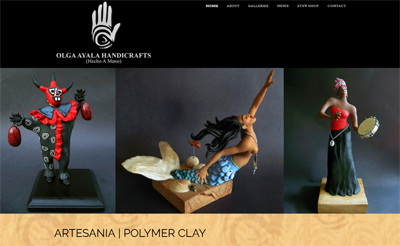Over time, her mother eventually returned to the arts to paint and create
ceramic pieces. It was her mother's work with ceramics that drew Olga's
attention and she began to explore this art form as well. Once again, Olga's
mother opened another creative door. Olga experimented, but did not feel
satisfied by the results from ceramics. This interest in ceramics did
however lead her to explore working with polymer clay.
Olga found that she liked working with polymer clay more than the
ceramics for a number of reasons. While polymer clay is moldable like
traditional clay, she found that it did not need the high temperatures,
necessary for regular clay, to fire it. She discovered that polymer clay
could be "cooked" to hardness in a regular oven, the process is quicker and
the results more consistent.
Olga found her artistic calling through her polymer clay creations. With her
hands she molds life into objects and figures depicting everyday life, dance
and music. Many of her creations reflect her Puerto Rican culture and the
love and respect she feels towards it.
Q&A with Olga -
DCB: In reading the various articles about you, I picked up on a
couple of threads of information that I wanted to clarify. What people or
occurrences influenced your becoming an artist, besides your mother? One
article mentioned your grandfather. Can you tell us something about his
influence?
Olga: My maternal grandfather, Gregorio Marzan once asked me
as a young girl what I wanted to be when I grew up. When I told him I wanted
to be an artist, he laughed and said I would starve and struggle all my life
and only find fame once I’m dead! He worked in a doll factory at the time
and he would always bring me really cool toys from work, such as marionette
puppets that were more like works of art than toys. In his spare time he
often “tinkered” with found objects and created whimsical pieces and made
toys for me.
When he retired, he took his “tinkering” to a whole new level. He began to
create sculptures using papier-mâché and ordinary household objects like
popsicle sticks, gift wrap paper, wire hangers, and wigs to name a few. He
continued to amaze me on how you can take “junk” and transform it. All you
needed was a vision, the rest would follow.
Before I knew it, his work was being recognized by collectors of folk art
and was included in various museum exhibitions and private collections. By
this time he was hard of hearing and partially blind. He also had prostate
cancer, but he kept working.
About Gregorio Marzan
Wikipedia
SAAM page for Gregorio Marzan
Smithsonian American Art Museum
He died at the age of 91, and I believe it was his art that kept him going.
I look back on his comment to me as a young girl and smile, because despite
what he originally thought, he was proof that you can pursue your passion
and be recognized in your own lifetime.
DCB: I read that you have a deep love of music and (like your
father) play percussionist instruments. Is this pursued more for fun or do
you play in a band now or have you ever?
Olga: I wanted my father to teach me to play timbales when I
was little but he didn’t believe playing drums was appropriate for girls.
When we would have parties my father would take out the cowbell, maracas,
claves, guiro and anything else that was small that you could beat a rhythm
on and pass them out to anyone willing to play or make fools of them selves
in the name of fun. I eventually started my own collection and learned with
his guidance how to really play them. Although I don’t play professionally,
I’m a star in my own mind! LOL!
DCB: With your father being a practicing musician, you were
influenced musically and artistically by what you heard and saw. When did
you begin creating artistic pieces reflecting music and dance?
Olga: Although my father doesn’t play in public anymore,
memories of seeing him perform, his facial expressions, the way he would
grunt to keep the beat, are still fresh in my mind. These memories transfer
to the physical gestures, movement, and expressive faces found in many of my
pieces.
My sculpts of musicians and dancers began when my daughter was 7 years old.
At the time we lived in an area of Staten Island with very few Latinos. I
started to use my art as a creative method of introducing her to our culture
on a daily basis.
These days I’m often commissioned to create portrait sculpts of musicians
and dancers, many of them Puerto Rican folk musicians, along with other
musical genres.
DCB: Of the artistic pieces you have created, what is your
favorite and which would be the most memorable (if it is not the same
piece)?
Olga: Whoa! That would be like trying to decide if I had
more than one child, which one is my favorite. They’re all my “children” and
I love them all for different reasons.
DCB: Thanks for being part of DC Bebop Arts page and for
taking the time to answer a few questions. I hope that anyone reading
about you here will visit the links to see your fabulous work and if in the
area of an exhibit, will take the time to walk-in to experience them
first-hand.
 Olga's website
Olga's website
 Olga's website
Olga's website